Add-ons and services available for some purchases in cart
Protect your Purchase
White Glove Installation
Haul Away
Buyer’s Guide to Washers & Dryers
- Searching for the right washer and dryer for your home? Conn’s HomePlus offers washing machines and dryers from top appliance brands, like Samsung, LG, and GE. To help you with your washer and dryer purchase, we’ve put together this buyer’s guide. It has all you need to consider, from the benefits of different types of washers and dryers to essential features, user reviews, and more.
- Whether you’re looking to add a top-load washer to your laundry room or a stacked washer-dryer to your basement, be sure to read this first. The more you know, the easier your decision will be!
Types of Washers
Every washing machine has pros and cons. While they’ll all help clean your clothes, different designs do so in different ways. Want to figure out which washer style is best for you? Keep reading, then browse Conn’s HomePlus to select the ideal color, capacity, and price as well.
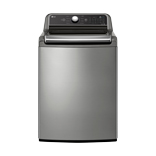
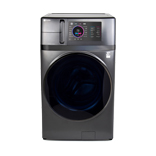
Top-load washers
- Affordability and convenience set top-load washers apart. It’s not only extremely easy to load and unload your clothes, but this affordable washing machine’s big tub can usually hold more — well-suited for families that need a large-capacity washer on laundry days. This also can help reduce time doing laundry. Nice, right?! Additionally, top-load washers aren’t as prone to mildew and mold buildup as front-load washers since the water doesn’t collect near the door.
- On the flip side, homes with less space are more likely to choose front-load washers since top-load washers can’t be stacked. And reaching into the bottom of this washer can be difficult at times. Lastly, top-load washers often require more water and energy while also causing more wear and tear on clothing.
Front-load washers
- Efficiency is a huge part of why front-load washers are perhaps the most popular kind of washer. This high-efficiency washer doesn’t have agitators. It uses molded vanes to move and clean your laundry. This results in less water and electricity being used as well as a gentler tumbling process. In the long run, you’ll save money and power and enjoy long-lasting clothes by choosing an energy-efficient front-load washer. Plus, they can be stacked to help you save space, and they come with numerous advanced features, like noise reduction, Wi-Fi, and steam cleaning.
- However, front-load washers do have drawbacks, including the added difficulty with loading them and greater expense when having them serviced. And the biggest complaint about front-load washers is the inability to add items during the wash cycle. The door locks, so you can’t pop in a few items of clothing you forgot.
Combination washer-dryers
- Some things are just better together. When it comes to laundry appliances, there are several advantages to combination washer-dryers. These all-in-one washers and dryers take up less floor space, instead using the lesser used vertical area of a home. Perfect for small apartments, RVs, or homes with limited laundry areas. Better still, these compact washer-dryers often use a ventless drying system, so they can be installed almost anywhere as long as you have the right electric setup. Conn’s HomePlus carries multiple versions, from classic style combination washer-dryers to more modern washer-dryer all-in-ones.
- However, combo washer-dryers have a smaller capacity, meaning multiple loads to get the same amount of clothes clean. Plus, this type of washing machine typically takes more time to completely wash and dry your laundry. As with many laundry appliances, this variety can experience problems that you may need to repair. Common issues include poor dryer performance, clogged lint filters, and drum malfunctions.
Smart washers
- How would you like to control your washer with the touch of a button...from your phone? Smart washers offer cutting-edge technology to the laundry process. From starting and stopping your washer to remote monitoring and alerts while you’re away from home, these luxury washers make laundry days as hassle-free as possible. Conn’s HomePlus offers many different smart washer styles: large capacity, top load, front load, and more. Depending on the brand, you may also enjoy features such as super speed wash, automatic detergent dispensing, and energy-saving settings.
- While smart washers can be more expensive, they offset the initial costs over time thanks to their efficiency. Obviously, repairs for smart washers can be more expensive due to specific electronic accessories that may need to be replaced when not working correctly.
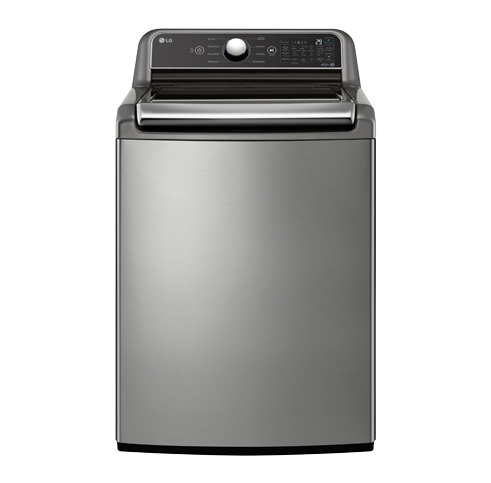
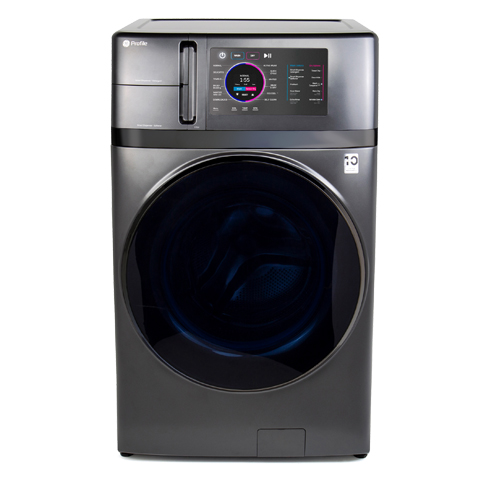
Types of Dryers
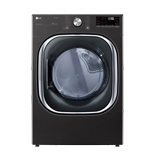
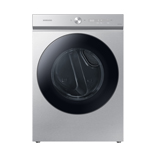
Electric
- Say hello to the most common type of dryer, the electric dryer. This type is easy to install, but it requires a dedicated electrical connection. Many electric dryers have a 240-volt current, twice the power of your standard house current, to fuel the heating coils. Some electric dryers can operate on a 110-volt current. While there are some ventless electric dryers, most will need to be vented outside to eliminate any moisture and hot air from the drying cycle. At Conn’s HomePlus, we have a variety of electric dryers for sale with stainless-steel finishes, matching sets, high-capacity options, and so much more.
- Electric dryers have lots of advantages. Perhaps the biggest is that they’re one of the most affordable dryers. Also, they’re relatively simple to install and maintain.
- The main drawback of this type is that they take longer to dry clothes than gas dryers. Why, though? In essence, it’s because they just don't get as hot as gas dryers.
Gas
- Gas dryers use natural gas or propane to heat the air used to dry clothes, with a burner that ignites. This heated air circulates through the drum to dry the clothes then goes through a vent to remove moisture from the clothes and be released outside. However, they require a gas line connection and dedicated venting as well.
- Compared to electric dryers, gas versions typically dry clothes faster, granting you long-term savings on costs and energy. At Conn’s HomePlus, we offer a wide selection of gas dryers to choose from.
- Because this type of dryer needs a gas line, they can be costly to install if you don't already have one. Plus, they’re also more expensive upfront than electric dryers, so you'll need to weigh the long-term savings on your utility bills versus the initial investment.
Industrial/commercial dryers
- Some dryers aren’t usually found inside a home, like industrial dryers. These are super-sized machines designed to handle a lot of laundry. You’re most likely to find them in hotels, hospitals, and other commercial places. They’re far different from household dryers in terms of size, power, and capabilities.
- Due to their size, commercial dryers have several advantages over household versions. First, they’re more durable and built to withstand the rigors of daily commercial use. Plus, they have a much larger capacity, which allows for quick and efficient drying of a huge volume of laundry.
- The main drawback of industrial dryers is their size and cost. They’re too large and heavy to have in most homes, making them difficult to move and install, and require a significant amount of space to operate.
Vented
- Vented dryers are the most common type of dryer. They pull air in from the surrounding environment and then heat it up. Next, the hot air circulates through the dryer drum, with your clothes in it. As the air moves around the clothing, it picks up moisture, which is then vented outside through a duct.
- One bonus of this process? It naturally helps reduce the humidity in your home. These dryers are typically more affordable than other types and are easy to install.
- However, they require a dedicated venting system and may not work if you live in an apartment or a home without the right ventilation setup. Plus, in rare cases, the duct can become clogged, causing the dryer to not work as well.
Condenser
- Don’t want to deal with a venting duct? Your best option may be a condenser dryer. Instead of venting the moist air outside, this air goes through a condenser unit, cooling and removing the moisture. The dry air is then reheated and circulated back into the drum to continue the drying process. Afterward, you can simply empty the moisture from a designated container.
- These convenient dryers are more energy efficient and give you flexibility in placement, making them great for homes without venting systems.
- On the flip side, they tend to take longer to dry clothes, may require more maintenance, and can often be more expensive.
Heat pump
- Welcome to the future. Heat pump dryers use advanced technology to recycle the hot air used to dry clothes, so they’re one of the most energy-efficient types of dryers. Rather than heating air like a traditional dryer, this kind circulates hot air through the drum, and then uses the heat pump to extract moisture from the air.
- There are plenty of advantages thanks to the heat pump system. Namely, energy efficiency. This kind of dryer uses about half as much energy as classic dryers. That can mean big savings on utility bills over time! Additionally, by using lower temps to dry clothes, they’re less likely to damage delicate fabrics.
- Of course, this lower temperature also means that they take longer to dry your clothes than a traditional dryer would. And their high level of energy efficiency comes with a bigger price tag.
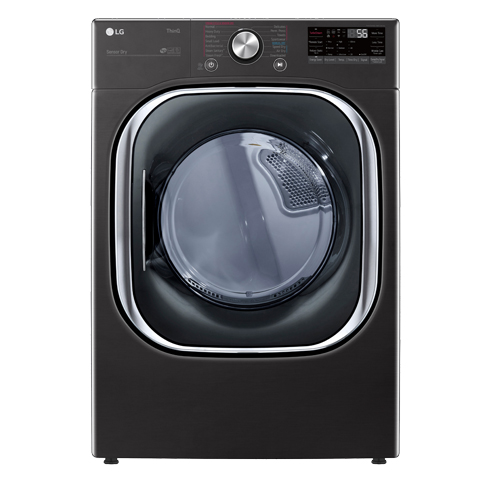
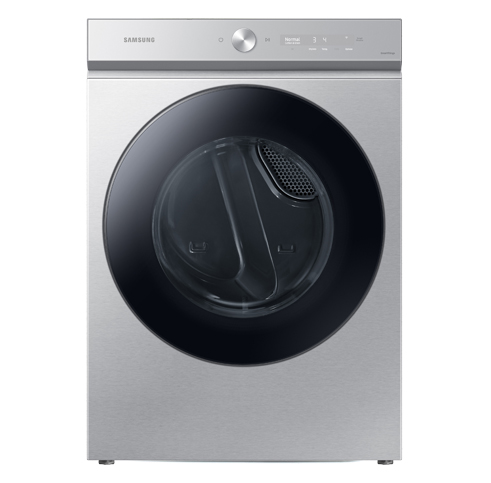
Key Features & Technologies
The list of washer and dryer features is nearly endless. Here’s a quick overview of some of the best features and technology available for your laundry appliances: drying programs, sensor drying, steam or sanitization cycles, and smart/connected capabilities, to help buyers understand their benefits and choose the best options for their needs.
Washer features:
- Wash cycles Modern washers have different wash cycles with unique functions, making the washing experience as efficient as possible. Common wash cycles include normal, delicate (or hand-washable cycles), permanent press, and heavy-duty. There are also quick wash options that help you save time and water. Conn’s HomePlus carries high-tech washers that provide specialty cycles as well, such as allergen, sanitize, bedding, activewear, denim, and more. Each one has a specific washing time, temperature, and spin speed that’s ideally suited for that fabric or clothing type. If you’re unsure which cycle to use, be sure to check the tags on your clothes.
- Water level There’s a Goldilocks zone where the amount of water you’re using to wash your clothes is just right. That’s why most washers give you low, medium, and high water level options. Choosing the appropriate level helps you conserve water and energy. Your small loads of laundry are fine with the low level, but larger loads or heavily soiled items need a high water level to make sure everything gets cleaned thoroughly.
- Automatic temperature control Washers with auto temperature control technology detect the water temperature and adjust the heating element accordingly. This feature also ensures that the water temperature stays consistent during the washing cycle — a crucial part to completely cleaning clothes and removing stains.
- Internal water heater Similar to auto temperature control, built-in water heater washing machines effectively adjust the appliance’s water temperature. Since hot water more effectively cleans clothes, maintaining the perfect temperature no matter the season is critical. This ability is especially important for heavily soiled items, so it’s a popular pick for those with kids, pets, or both.
- Pause cycle Need to add one more piece of clothing mid-wash? Want extra-dirty clothes to soak a bit longer? Washers with a pause button or pause mode make it easy. Keep in mind that some models may have a lock feature that won’t let you access the clothes until the drum is drained. Also, letting damp clothes sit for several hours isn’t a good idea as they’ll start to grow bacteria and mold.
- Maintenance and mold prevention From washers treated with antimicrobial technology to models that can automatically self clean, Conn’s HomePlus has premium washers that are easy to maintain in tip-top shape. Plus, we only carry the best brands with high-quality washer construction. So everything is properly built and sealed to better prevent any issues.
- Built-in sink and water jet If you want to meticulously clean items, some washers come with a sink and water source. It’s one of the most practical pre-treat options (along with washers with built-in dispensers for detergent). The sink and jet let you scrub or soak items effortlessly before fully washing them. Plus, it saves you space in utility and laundry rooms that otherwise might have required a sink.
- Automatic detergent dispensers This is one of the most convenient features of modern washers. Basically, your washer stores a supply of detergent in a dedicated compartment. Once a cycle starts, the detergent is released into the drum automatically. Neat, right? In addition to detergent, some models can dispense fabric softener, bleach, or other cleaning agents.
- Load-balancing For a washer that runs super smoothly and quietly, you need load-balancing. This handy feature keeps wet clothes from building up on one side of the drum as it spins. The effects? Reduced noise, increased energy efficiency, and a longer life for your washer. Load-balancing washers are a good choice for large families or those who frequently wash heavy items like comforters, bedding, and towels.
Dryer features:
- Reverse tumbling No, this isn’t a gymnastics move. Reverse tumble dryers help keep clothes from bunching and creasing. It does this by having the drum change direction in the middle of a cycle. The result? Fast, even drying that gives clothing a fresh look when they come out of the dryer. Seriously, no ironing or wrinkle-remover spray required.
- Post-dry or extended tumbling Dryers with an extended tumble feature also provide ready-to-wear clothes right out of the machine. Again, this reduces wrinkling and saves you the time of hanging up or laying flat your clothing to dry. That’s because post-dry tumbling washers go beyond the normal cycle, allowing your clothes to completely dry without sitting long enough to get messy.
- Moisture sensors Do you get frustrated when a dryer cycle is complete but the clothes aren’t fully dry? Think about getting a dryer with a moisture sensor or sensor dry technology. These cutting-edge machines adjust the drying time depending on how much moisture is detected. Not only does this ensure no damp items, but it also helps prevent over-drying of your clothes, which can end up damaging clothing.
- Heat pump technology Heat pump dryers use advanced technology to recycle the hot air used to dry clothes, so they’re one of the most energy-efficient types of dryers. Rather than heating air like a traditional dryer, this kind circulates hot air through the drum, and then uses the heat pump to extract moisture from the air.
- Drying rack Finally, the solution for stuffed animals, shoes, sweaters, and more — dryers with a drying rack. These racks fit snugly inside the dryer and give you a flat area for your items to dry on. Some dryers come with a drying rack included, while others have racks that can be bought separately. Thankfully, drying racks are easy to insert and remove from the dryer, so you won’t waste lots of time doing it.
Energy Efficiency
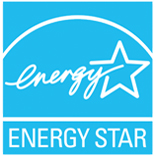
- It’s important not to overlook the energy efficiency of a washer and dryer you’re thinking about buying. The typical washing machine averages over 40 gallons of water per load, with around 350 loads of laundry each year. Cutting down on your water usage and total number of loads annually can have a big impact. First off, energy-efficient appliances affect your monthly utility bills and, therefore, your wallet as well. In short? They save you money by using less electricity, water, etc. Better still, energy-efficient washing machines and dryers mean less laundry detergents and dryer sheets being used, reducing the opportunity for hazardous chemicals.
- In general, front-loading washers are more eco-friendly because they ordinarily use less water. There are, of course, high-efficiency top-loading washers, too. A couple easy ways to improve your laundry efficiency? If possible, choose the smallest washer and dryer you need and try to only clean your clothing when it’s actually dirty.
- But what determines a washer or dryer’s Energy Star certification? Energy Star-rated washers use less energy without sacrificing performance or functionality, utilizing 25% less energy and 33% less water. Energy Star-rated dryers, on the other hand, use 20% less energy than standard models. Both of these ratings are achieved by meeting strict government standards. When shopping at Conn’s HomePlus, simply click the “Energy Star” filter to see the eco-conscious washers and dryers available.
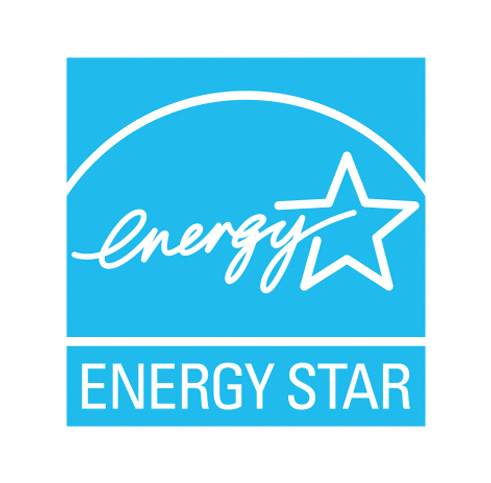
Capacity & Size
- What do we mean by capacity when talking about washers and dryers? Capacity expresses the amount of laundry that can be loaded into the washer or dryer at one time. The capacity for most laundry appliances is measured in cubic feet. The more cubic feet available, the more space you have to wash and dry your clothes.
- There are a few key benefits to larger capacity appliances. First off, they save you time and effort — especially for households with more people. Secondly, a larger size can help reduce wear and tear on your appliances. That’s because when a washer or dryer is overloaded, it has to work extra hard, leading to more strain on the machine over time. This can cause more repairs or a shorter lifespan for the appliance.
- Conn’s HomePlus carries a wide range of appliances, from small-capacity washers with only 4.2 cu. ft. of space to mega-capacity dryers with 9 cu. ft. of room inside. We also offer a variety of appliance sizes. There are slim washers and dryers that are only 23” wide, but also extra-wide appliances that can are nearly 33” in width. That’s why it’s important to measure your available space and pay attention to washer and dryer sizes when shopping for them.
Noise Level & Vibration Control
- It may not be top of mind, but how soft or loud appliances are can drastically impact how you feel about your purchase, especially afterward. So it’s important to think about it before you buy! Worried about disturbing family members or neighbors? Want a more peaceful laundry experience? Look for washers and dryers from Conn’s HomePlus designed with special insulation and vibration-reducing features that will absorb excess sound, keeping it from escaping.
- Quiet washers and dryers with noise-reduction technologies are easy on the ears. These washers and dryers with low noise levels lead to lower stress levels, too. Who knew that laundry day could affect your mood so much? If your appliances are placed in an open space that echoes sound or a smaller apartment, vibration-reducing features make a big difference. Trust us, there’s nothing quite as annoying as washers and dryers that shake or rumble when in use.
- When browsing our selection, remember that front-loading washers and gas dryers are often quieter than top-loaders and electric dryers. Aso, be sure to check the decibel (dB) rating of the machine if it’s available. Decibel ratings below 50 are considered quiet, while those above 60 may be too loud. That might seem like a small window, but it’s definitely noticeable.
Venting Requirements
- Vented dryers These dryers require an exhaust duct to be installed to vent hot air outside. The vent can be located on the rear, side, or bottom. However, some versatile models let you choose where the dryer vent comes from. Instead of only giving you one option for a vent connection, three or four-way venting dryers allow you to remove a panel and easily orient your dryer exactly how you want. It also better prevents bends and long ducts.
- Want to be on the cutting-edge? Some smart dryers with vent sensors monitor the air duct and notify you when it needs to be cleaned. This helps maintain the machine for longer and keep it at a peak performance level. One last thing to keep in mind is that larger venting capabilities provide more flexibility, better airflow, and an easier dryer installation.
- Ventless dryers No exhaust duct? No problem. Ventless dryers don’t need a duct because they use a condensation-based system to remove moisture from your clothing. Impressive, right? Another ventless option is a portable dryer, which is a practical choice if you don’t have a lot of space or usually just do small loads of laundry. One overall benefit is that this type of dryer is more energy efficient. Plus, you won’t have to worry about duct maintenance, so it’s hassle-free!
Brands & Manufacturers
- LG Not only do LG washers and dryers get the job done, but they also offer a few advanced tech touches on top. This brand delivers high-quality front-load and top-load washers and often builds them with slim profiles that fit into smaller spaces. If you want the most luxurious washers and dryers with all the bells and whistles, LG might be your best bet. Because when it comes to high-end models, Conn’s HomePlus offers several LG laundry appliances at $2,000 or more. As a bonus, LG is an appliance brand with a track record of reliability. So you can have confidence in your purchase.
- Samsung Samsung offers laundry appliances at good, better, and best price points, depending on the features and size. This lets you easily find what you’re looking for based on price point. In fact, many of the most affordable washers and dryers that Conn’s HomePlus carries are Samsung models. Dozens of these appliances come in at a really reasonable $1,000 or less. Plus, Samsung is unique in that it tries to add high-end features even to its basic washers and dryers. This includes Wi-Fi connectivity, so you can more easily manage laundry day.
- Whirlpool This American appliance company may not be as tech-savvy as other manufacturers. However, it has a reputation for affordability and stands out for a number of other reasons. Whirlpool washers and dryers often have a sleek, minimalist look, lots of cycle options, large auto dispensers, steam capabilities, and easy-to-understand controls. While Whirlpool provides a 12-month limited warranty, this brand doesn’t have the best reputation for its machine’s longevity or reliability. That’s why they typically score lower when it comes to customer satisfaction.
- GE Conn’s HomePlus has a variety of GE laundry machines, from compact washers and dryers at budget-friendly price points to reasonably priced smart washers and electric dryers with details like remote monitoring, real-time notifications, damp alert, and SmartDispense for automatic detergent dispensing. In general, GE appliances are highly rated by customers. One thing that sets GE options apart? They’re excellent at mold prevention courtesy of an UltraFresh™ Vent System+ and Microban® antimicrobial technology. Lastly, GE has an exceptionally fast spin rate. What does that mean exactly? Less time for your clothes to dry and less chance for shrinkage.
Price Range & Budget
- Your washing machine and dryer are essential household appliances that deserve lots of thought before finally buying them. Here are some quick tips for getting the best bang for your buck:
- Size (and capacity) matters: Choose a washer and dryer that can accommodate the size of your household's laundry needs. Have a big family? You’ll probably need a mega-capacity washing machine or an efficient washer-dryer combination that may require more loads to finish your laundry. Yes, large-capacity washers and dryers may be costlier, but they can save time and energy, too.
- Think energy efficiency: If you’re envisioning the long-term, you may want energy-efficient washers and dryers. After all, these can save you money on your utility bills, which add up over time. Just be sure to find Energy Star-rated washers and dryers as these meet strict efficiency standards. Keep in mind though that this type of appliance can come with a slightly higher price tag.
- Determine your type: Affordable washers and dryers can cost less than $400. It simply depends on the type of washer and dryer you need. Whether you choose front-loading, top-loading, portable, or combination washer-dryers, each type has its advantages and disadvantages. However, it’s important to remember that more traditional washers and dryers can be priced between $600 and $800 while those with advanced features and technology will be a bit more.
- Don’t discount durability and reliability: Does your washer and dryer brand have a good reputation? Is it known for lasting a long time? Has the brand itself been around for awhile? It may seem insignificant, but doing some initial research will save you headaches down the road. One crucial thing to do? Read reviews and ask for recommendations from family and friends. Real people and real-world experiences can shed a lot of light on the unseen pros and cons of different washers and dryers.
- Features and technology: If you want more than just a basic washer and dryer, check out larger capacity models or those with smart features. Ultra-large capacity washers and premium smart dryers can cost over $2,000. However, the cost comes with several key benefits. These types of luxury laundry appliances boast sleek, space-saving designs along with smart capabilities. That may include AI fabric sensors, advanced washing and drying technologies, steam cleaning, and scratch-resistant materials.
- Budget: Conn’s HomePlus has budget-friendly washers and dryers as well as deluxe smart models. The pricing between these can vary. A lot. So figure out your budget first, determine what you’re prioritizing in your appliances, and stick to it.
User Reviews & Ratings
- If you want to get a sense of how an appliance functions in everyday life or in a specific situation, don’t forget to check the washer and dryer reviews. Reading these appliance ratings is an important part of the shopping process. Trust us, you’ll find some unexpected gold in reviews. Because there are often things you would’ve never considered that someone else has experienced and shared.
- Not sure how to spot a real review versus a fake one? Here are three quick tips. First, check to see if the reviewer has reviewed other products. Fake accounts sometimes only review one thing. Second, be aware of mistakes with spelling and grammar since that can also point to a fake reviewer. Finally, while many user reviews will have “I,” “me,” or “my” in them, genuine reviews will use these words naturally and sparingly. Conn’s HomePlus shares authentic user reviews at the bottom of each product page, so you can see for yourself what other people think of any item.
Comparisons and reviews
- Front-load vs. top-load washersChoosing between a front-load and top-load washer? It ultimately depends on what you like and what you need. Front-load washers are generally more energy-efficient, have a larger capacity, and use less water. Top-load washers, on the other hand, are typically more affordable than front-loaders, are easier to load, and can sometimes provide a deeper cleaning of really dirty clothes.
- Portable vs. full-size washers If you’re wondering whether a portable or full-size washer is best, here are some things to remember. Portable washers are smaller and lighter than full-size models. This makes them ideal for those who live in apartments, travel a lot, or have limited room for an appliance. Meanwhile, full-size washers provide a larger capacity and more features. They're ideal for families or anyone who does a lot of laundry. And since they can handle bigger loads, you'll spend less time doing laundry overall.
- High-efficiency vs. traditional washers For a more eco-friendly appliance, consider getting a high-efficiency washer. These machines use less water, detergent, and energy compared to traditional washers, resulting in a lower utility bill. As for the advantages of classic washers, they’re usually less expensive than HE washers and can be easier for DIY repairs.
- Smart vs. non-smart washers If you’re busy, often away from home, or want the most high-tech washer available, a smart washer might be right for you. These super-convenient appliances let you start or stop a load of laundry from anywhere, receive notifications when a wash cycle is done, and even troubleshoot problems remotely. Plus, they’re energy efficiency, often featuring built-in sensors to better control water levels, energy usage, temperature, and more. However, non-smart washers are more inexpensive and can be simpler to use. Also, they’re re more options available. So you have a bigger selection of brands and models to choose from.
- Washer-dryer combinations vs. separate units Have limited space in your home? Washer-dryer combos take up less room than separate laundry appliances. Of course, these combined machines might offer smaller load capacities and longer cycle times. Additionally, when one part of the washer-dryer combination unit breaks down, sometimes both appliances need to be fixed. On the plus side for individual units, this kind of setup gives you more flexibility in terms of placement.
- Laundry appliances are a big investment, so be sure to research and find the one that works best for you and your family. You can find a wide variety of washers and dryers at Conn’s HomePlus. Whether you have good credit or are building credit, we have financing options available to help you get your favorite washer and dryer.
FAQs
-
What is the average cost of a washer, and how much does it vary by type and brand? How about dryers?
Super-affordable washers and dryers can cost less than $400, while more traditional laundry appliances can be priced between $600 and $1,000. On the more expensive side, ultra-large capacity washers and premium smart dryers can cost over $2,000. It all depends on the type of washer and dryer you need.


